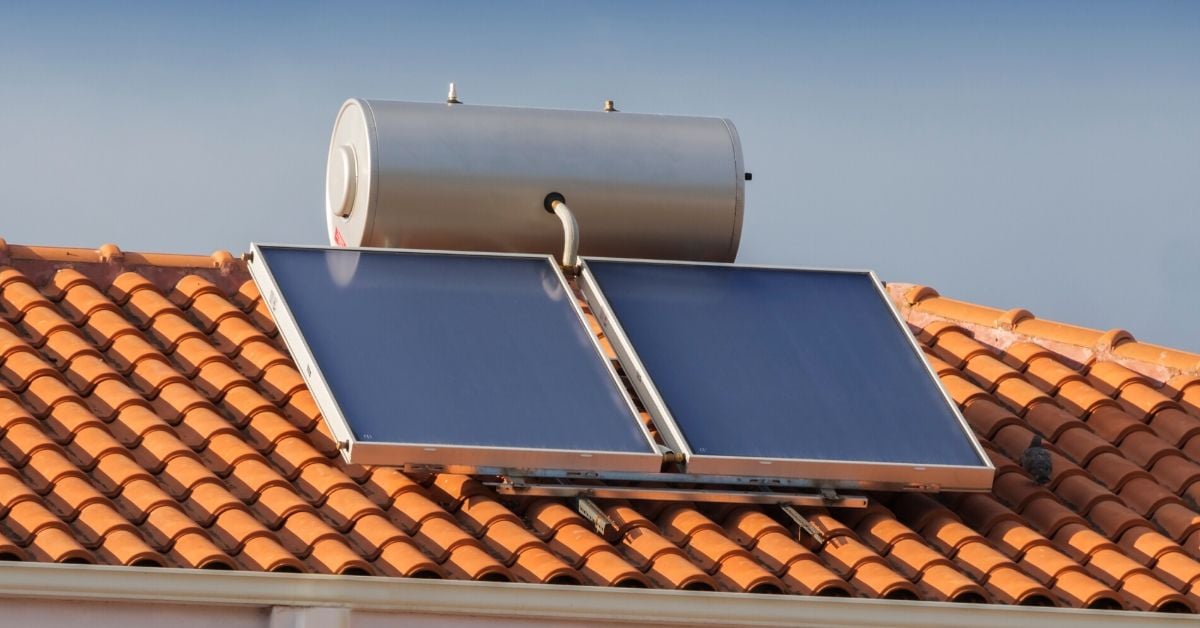
With 9 out of 10 Americans supporting the growth of solar, you might be wondering how you can incorporate green energy into your plumbing business. Luckily, the introduction of solar water heaters is bringing renewable resources into the plumbing mainstream. Keep reading for an in-depth breakdown of the functions of solar-powered water heaters and how you can incorporate this plumbing trend into your business.
What Is a Solar Water Heater?
Unlike traditional water heaters that must be connected to a home’s energy grid, solar water heaters operate on a completely separate system. These systems require only a solar collector and a water storage tank to operate. The solar collector, an insulated and weatherproof box containing energy-absorbing plates, uses energy from the sun to heat water stored within the tank.
What’s unique about this potential new service is that solar water heating systems do not require any existing solar panels to operate. This means that contractors can install a new solar-powered water heater with or without any current solar energy sources powering the home. For plumbing businesses just venturing into renewable energy, this offers a fantastic opportunity to explore solar energy without conflicting with other energy sources.
How Do They Operate?
A solar water heater system utilizes two main components: a storage tank and a solar collector. Solar energy is harnessed and converted into heat via an active or passive heating system before reaching the storage tank. Depending on the climate and efficiency needs of the customer, a plumbing business could choose to install either an active or passive solar water heating system.
Active Solar Water Heating System
An active water heating system incorporates the use of circulating pumps and controls to heat and distribute water throughout the home. Commercially, active heating units are classified into two separate systems:
- Direct Circulating Systems: Suitably used in locations where freezing weather isn’t an issue; these systems distribute water through the home by pumping it directly through the solar collector.
- Indirect Circulating Systems: For climates more prone to freezing temperatures, a non-freezing heat transfer fluid is first pumped through the collector where the water is then properly heated and distributed throughout the home.
Passive Solar Water Heating System
Although typically known to be less expensive than an active solar water heating system, a passive system risks being slightly less efficient than active systems. However, a passive solar water heating system also offers more reliability and a longer lifespan. The two classifications of passive heating systems include:
- Integral Collector-Storage Passive Systems: In favor of non-freezing climates, this system incorporates both the storage tank and collector into a single unit. This eliminates the need for the circulating pumps seen in an active system, making it one of the simplest heating methods.
- Thermosyphon System: Using the theory of “warm water rises, cold water sinks,” this system places a heavier water tank above the solar collector. Energy is absorbed through the connector while gravity pulls the cold water in the tank down and pushes heated water out. Because this system requires a heavy storage tank, contractors should be cautious of roof design.
What Are the Top Brands to Consider?
With the adoption of solar water heating solutions on the rise, so are the number of manufacturers offering solar systems. All manufacturers on the market today considered, a select few have emerged as top contenders in the green energy space.
1. Duda Diesel
With the company founder heavily focused around his studies in biodiesel and alternative energy production, Duda Diesel offers a robust variety of solar heating options. Ranging in 10 different storage size options from 100 to 1,000 liters, Duda Diesel offers complete system package sales as well as individual system part options to accommodate every contractor’s needs.
2. SunEarth
As one of the leaders in renewable energy technology options, SunEarth has manufactured multiple green energy options since 1978. Offering a variety of solar-powered options for contractors, SunEarth offers more SRCC certified options than anyone in the industry.
3. Sunbank Solar
Unlike many other green energy tech producers, SunBank Solar focuses only on the production of solar water heating solutions. Their passive solar water heating system packages are SRCC certified and come in 40 and 80-gallon options.
How Your Business Could Benefit from Solar Water Heating Solutions
As the expanding adoption of renewable energy sources continues to make its way into homes around the world, it may be time to consider adding solar water heating solutions to your business’s service list. With so many residential green energy solutions out there, homeowners are fighting to minimize those utility bills and could be in need of your help.
By offering a variety of solar-powered water heating solutions, you can attract customers and sell them on the long-term financial benefits of adopting such systems. You could be saving your clientele a ton on their energy bills month after month, which encourages customer loyalty and satisfaction. Not to mention the maintenance required on these systems, which secures a lasting relationship with the system provider and reliability on your business in particular.
Unfortunately, as with any other growing industry trends, the competition around such service offerings will only continue to grow as well. Taking the initiative now to move forward into offering solar water heating solutions can not only increase profit potential but also set your business up to be a local industry leader.
Licensing Requirements for Solar Water Heaters
As a contractor, it’s important to remain attentive to your local licensing and certification requirements, no matter what sector of the industry you’re in. State laws may require you to obtain proper licensing and/or certification to install solar water heater solutions to protect consumers from potentially unsafe practices . For example, Arizona, California, Florida, and Nevada are just some of the states that require solar contractors to obtain a state credential.
Certain states also require solar installers to receive a separate, specialized solar contractor’s license, though generally, solar is a specialty classification under a general plumbing license. Appropriately licensed contractors may install solar water systems without a specialty license. You can view the national solar licensing map on the Interstate Renewable Energy Council website to learn the specifics for your state.
Tapping into This 2020 Plumbing Industry Trend
Few industries evolve more than trades such as plumbing and HVAC-R. Be sure your company is keeping up to date by staying knowledgeable on current trends, such as solar water heaters. Not only will this green-inspired solution add a new service offering to your list, but it can also win you the trust of environmentally- and financially-conscious customers.
Want to offer your customers the best warranty programs in the HVAC and plumbing industries? Register for JB Warranties’ Premium Protection Plan today.
Brett Cue
Regional Manager - West Coast at JB Warranties






